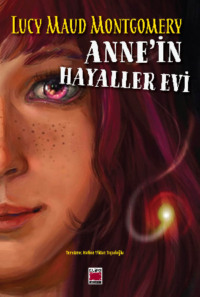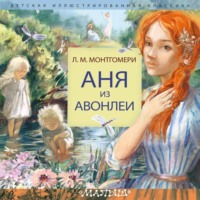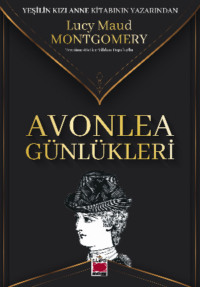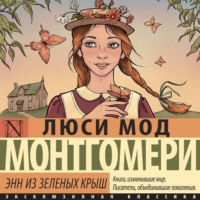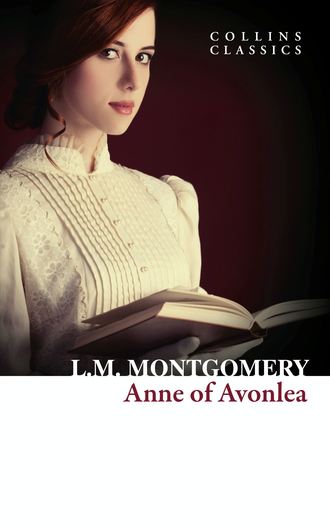
Полная версия
Anne of Avonlea
“No … no … not the wheat. But …”
“Then it’s the cabbages! She’s broken into my cabbages that I was raising for Exhibition, hey?”
“It’s not the cabbages, Mr. Harrison. I’ll tell you everything … that is what I came for—but please don’t interrupt me. It makes me so nervous. Just let me tell my story and don’t say anything till I get through—and then no doubt you’ll say plenty,” Anne concluded, but in thought only.
“I won’t say another word,” said Mr. Harrison, and he didn’t. But Ginger was not bound by any contract of silence and kept ejaculating, “Redheaded snippet” at intervals until Anne felt quite wild.
“I shut my Jersey cow up in our pen yesterday. This morning I went to Carmody and when I came back I saw a Jersey cow in your oats. Diana and I chased her out and you can’t imagine what a hard time we had. I was so dreadfully wet and tired and vexed—and Mr. Shearer came by that very minute and offered to buy the cow. I sold her to him on the spot for twenty dollars. It was wrong of me. I should have waited and consulted Marilla, of course. But I’m dreadfully given to doing things without thinking—everybody who knows me will tell you that. Mr. Shearer took the cow right away to ship her on the afternoon train.”
“Redheaded snippet,” quoted Ginger in a tone of profound contempt.
At this point Mr. Harrison arose and, with an expression that would have struck terror into any bird but a parrot, carried Ginger’s cage into an adjoining room and shut the door. Ginger shrieked, swore, and otherwise conducted himself in keeping with his reputation, but finding himself left alone, relapsed into sulky silence.
“Excuse me and go on,” said Mr. Harrison, sitting down again. “My brother the sailor never taught that bird any manners.”
“I went home and after tea I went out to the milking pen. Mr. Harrison,” … Anne leaned forward, clasping her hands with her old childish gesture, while her big gray eyes gazed imploringly into Mr. Harrison’s embarrassed face … “I found my cow still shut up in the pen. It was your cow I had sold to Mr. Shearer.”
“Bless my soul,” exclaimed Mr. Harrison, in blank amazement at this unlooked-for conclusion. “What a very extraordinary thing!”
“Oh, it isn’t in the least extraordinary that I should be getting myself and other people into scrapes,” said Anne mournfully. “I’m noted for that. You might suppose I’d have grown out of it by this time … I’ll be seventeen next March … but it seems that I haven’t. Mr. Harrison, is it too much to hope that you’ll forgive me? I’m afraid it’s too late to get your cow back, but here is the money for her … or you can have mine in exchange if you’d rather. She’s a very good cow. And I can’t express how sorry I am for it all.”
“Tut, tut,” said Mr. Harrison briskly, “don’t say another word about it, miss. It’s of no consequence … no consequence whatever. Accidents will happen. I’m too hasty myself sometimes, miss … far too hasty. But I can’t help speaking out just what I think and folks must take me as they find me. If that cow had been in my cabbages now … but never mind, she wasn’t, so it’s all right. I think I’d rather have your cow in exchange, since you want to be rid of her.”
“Oh, thank you, Mr. Harrison. I’m so glad you are not vexed. I was afraid you would be.”
“And I suppose you were scared to death to come here and tell me, after the fuss I made yesterday, hey? But you mustn’t mind me, I’m a terrible outspoken old fellow, that’s all … awful apt to tell the truth, no matter if it is a bit plain.”
“So is Mrs. Lynde,” said Anne, before she could prevent herself.
“Who? Mrs. Lynde? Don’t you tell me I’m like that old gossip,” said Mr. Harrison irritably. “I’m not … not a bit. What have you got in that box?”
“A cake,” said Anne archly. In her relief at Mr. Harrison’s unexpected amiability her spirits soared upward feather-light. “I brought it over for you … I thought perhaps you didn’t have cake very often.”
“I don’t, that’s a fact, and I’m mighty fond of it, too. I’m much obliged to you. It looks good on top. I hope it’s good all the way through.”
“It is,” said Anne, gaily confident. “I have made cakes in my time that were not, as Mrs. Allan could tell you, but this one is all right. I made it for the Improvement Society, but I can make another for them.”
“Well, I’ll tell you what, miss, you must help me eat it. I’ll put the kettle on and we’ll have a cup of tea. How will that do?”
“Will you let me make the tea?” said Anne dubiously.
Mr. Harrison chuckled.
“I see you haven’t much confidence in my ability to make tea. You’re wrong … I can brew up as good a jorum of tea as you ever drank. But go ahead yourself. Fortunately it rained last Sunday, so there’s plenty of clean dishes.”
Anne hopped briskly up and went to work. She washed the teapot in several waters before she put the tea to steep. Then she swept the stove and set the table, bringing the dishes out of the pantry. The state of that pantry horrified Anne, but she wisely said nothing. Mr. Harrison told her where to find the bread and butter and a can of peaches. Anne adorned the table with a bouquet from the garden and shut her eyes to the stains on the tablecloth. Soon the tea was ready and Anne found herself sitting opposite Mr. Harrison at his own table, pouring his tea for him, and chatting freely to him about her school and friends and plans. She could hardly believe the evidence of her senses.
Mr. Harrison had brought Ginger back, averring that the poor bird would be lonesome; and Anne, feeling that she could forgive everybody and everything, offered him a walnut. But Ginger’s feelings had been grievously hurt and he rejected all overtures of friendship. He sat moodily on his perch and ruffled his feathers up until he looked like a mere ball of green and gold.
“Why do you call him Ginger?” asked Anne, who liked appropriate names and thought Ginger accorded not at all with such gorgeous plumage.
“My brother the sailor named him. Maybe it had some reference to his temper. I think a lot of that bird though … you’d be surprised if you knew how much. He has his faults of course. That bird has cost me a good deal one way and another. Some people object to his swearing habits but he can’t be broken of them. I’ve tried … other people have tried. Some folks have prejudices against parrots. Silly, ain’t it? I like them myself. Ginger’s a lot of company to me. Nothing would induce me to give that bird up … nothing in the world, miss.”
Mr. Harrison flung the last sentence at Anne as explosively as if he suspected her of some latent design of persuading him to give Ginger up. Anne, however, was beginning to like the queer, fussy, fidgety little man, and before the meal was over they were quite good friends. Mr. Harrison found out about the Improvement Society and was disposed to approve of it.
“That’s right. Go ahead. There’s lots of room for improvement in this settlement … and in the people too.”
“Oh, I don’t know,” flashed Anne. To herself, or to her particular cronies, she might admit that there were some small imperfections, easily removable, in Avonlea and its inhabitants. But to hear a practical outsider like Mr. Harrison saying it was an entirely different thing. “I think Avonlea is a lovely place; and the people in it are very nice, too.”
“I guess you’ve got a spice of temper,” commented Mr. Harrison, surveying the flushed cheeks and indignant eyes opposite him. “It goes with hair like yours, I reckon. Avonlea is a pretty decent place or I wouldn’t have located here; but I suppose even you will admit that it has some faults?”
“I like it all the better for them,” said loyal Anne. “I don’t like places or people either that haven’t any faults. I think a truly perfect person would be very uninteresting. Mrs. Milton White says she never met a perfect person, but she’s heard enough about one … her husband’s first wife. Don’t you think it must be very uncomfortable to be married to a man whose first wife was perfect?”
“It would be more uncomfortable to be married to the perfect wife,” declared Mr. Harrison, with a sudden and inexplicable warmth.
When tea was over Anne insisted on washing the dishes, although Mr. Harrison assured her that there were enough in the house to do for weeks yet. She would dearly have loved to sweep the floor also, but no broom was visible and she did not like to ask where it was for fear there wasn’t one at all.
“You might run across and talk to me once in a while,” suggested Mr. Harrison when she was leaving. “’Tisn’t far and folks ought to be neighborly. I’m kind of interested in that society of yours. Seems to me there’ll be some fun in it. Who are you going to tackle first?”
“We are not going to meddle with people … it is only places we mean to improve,” said Anne, in a dignified tone. She rather suspected that Mr. Harrison was making fun of the project.
When she had gone Mr. Harrison watched her from the window … a lithe, girlish shape, tripping lightheartedly across the fields in the sunset afterglow.
“I’m a crusty, lonesome, crabbed old chap,” he said aloud, “but there’s something about that little girl makes me feel young again … and it’s such a pleasant sensation I’d like to have it repeated once in a while.”
“Redheaded snippet,” croaked Ginger mockingly.
Mr. Harrison shook his fist at the parrot.
“You ornery bird,” he muttered, “I almost wish I’d wrung your neck when my brother the sailor brought you home. Will you never be done getting me into trouble?”
Anne ran home blithely and recounted her adventures to Marilla, who had been not a little alarmed by her long absence and was on the point of starting out to look for her.
“It’s a pretty good world, after all, isn’t it, Marilla?” concluded Anne happily. “Mrs. Lynde was complaining the other day that it wasn’t much of a world. She said whenever you looked forward to anything pleasant you were sure to be more or less disappointed … perhaps that is true. But there is a good side to it too. The bad things don’t always come up to your expectations either … they nearly always turn out ever so much better than you think. I looked forward to a dreadfully unpleasant experience when I went over to Mr. Harrison’s tonight; and instead he was quite kind and I had almost a nice time. I think we’re going to be real good friends if we make plenty of allowances for each other, and everything has turned out for the best. But all the same, Marilla, I shall certainly never again sell a cow before making sure to whom she belongs. And I do not like parrots!”
CHAPTER 4
Different Opinions
One evening at sunset, Jane Andrews, Gilbert Blythe, and Anne Shirley were lingering by a fence in the shadow of gently swaying spruce boughs, where a wood cut known as the Birch Path joined the main road. Jane had been up to spend the afternoon with Anne, who walked part of the way home with her; at the fence they met Gilbert, and all three were now talking about the fateful morrow; for that morrow was the first of September and the schools would open. Jane would go to Newbridge and Gilbert to White Sands.
“You both have the advantage of me,” sighed Anne. “You’re going to teach children who don’t know you, but I have to teach my own old schoolmates, and Mrs. Lynde says she’s afraid they won’t respect me as they would a stranger unless I’m very cross from the first. But I don’t believe a teacher should be cross. Oh, it seems to me such a responsibility!”
“I guess we’ll get on all right,” said Jane comfortably. Jane was not troubled by any aspirations to be an influence for good. She meant to earn her salary fairly, please the trustees, and get her name on the School Inspector’s roll of honor. Further ambitions Jane had none. “The main thing will be to keep order and a teacher has to be a little cross to do that. If my pupils won’t do as I tell them I shall punish them.”
“How?”
“Give them a good whipping, of course.”
“Oh, Jane, you wouldn’t,” cried Anne, shocked. “Jane, you couldn’t!”
“Indeed, I could and would, if they deserved it,” said Jane decidedly.
“I could never whip a child,” said Anne with equal decision. “I don’t believe in it at all. Miss Stacy never whipped any of us and she had perfect order; and Mr. Phillips was always whipping and he had no order at all. No, if I can’t get along without whipping I shall not try to teach school. There are better ways of managing. I shall try to win my pupils’ affections and then they will want to do what I tell them.”
“But suppose they don’t?” said practical Jane.
“I wouldn’t whip them anyhow. I’m sure it wouldn’t do any good. Oh, don’t whip your pupils, Jane dear, no matter what they do.”
“What do you think about it, Gilbert?” demanded Jane. “Don’t you think there are some children who really need a whipping now and then?”
“Don’t you think it’s a cruel, barbarous thing to whip a child … any child?” exclaimed Anne, her face flushing with earnestness.
“Well,” said Gilbert slowly, torn between his real convictions and his wish to measure up to Anne’s ideal, “there’s something to be said on both sides. I don’t believe in whipping children much. I think, as you say, Anne, that there are better ways of managing as a rule, and that corporal punishment should be a last resort. But on the other hand, as Jane says, I believe there is an occasional child who can’t be influenced in any other way and who, in short, needs a whipping and would be improved by it. Corporal punishment as a last resort is to be my rule.”
Gilbert, having tried to please both sides, succeeded, as is usual and eminently right, in pleasing neither. Jane tossed her head.
“I’ll whip my pupils when they’re naughty. It’s the shortest and easiest way of convincing them.”
Anne gave Gilbert a disappointed glance.
“I shall never whip a child,” she repeated firmly. “I feel sure it isn’t either right or necessary.”
“Suppose a boy sauced you back when you told him to do something?” said Jane.
“I’d keep him in after school and talk kindly and firmly to him,” said Anne. “There is some good in every person if you can find it. It is a teacher’s duty to find and develop it. That is what our School Management professor at Queen’s told us, you know. Do you suppose you could find any good in a child by whipping him? It’s far more important to influence the children aright than it is even to teach them the three R’s, Professor Rennie says.”
“But the Inspector examines them in the three R’s, mind you, and he won’t give you a good report if they don’t come up to his standard,” protested Jane.
“I’d rather have my pupils love me and look back to me in after years as a real helper than be on the roll of honor,” asserted Anne decidedly.
“Wouldn’t you punish children at all, when they misbehaved?” asked Gilbert.
“Oh, yes, I suppose I shall have to, although I know I’ll hate to do it. But you can keep them in at recess or stand them on the floor or give them lines to write.”
“I suppose you won’t punish the girls by making them sit with the boys?” said Jane slyly.
Gilbert and Anne looked at each other and smiled rather foolishly. Once upon a time, Anne had been made to sit with Gilbert for punishment and sad and bitter had been the consequences thereof.
“Well, time will tell which is the best way,” said Jane philosophically as they parted.
Anne went back to Green Gables by way of Birch Path, shadowy, rustling, fern-scented, through Violet Vale and past Willowmere, where dark and light kissed each other under the firs, and down through Lover’s Lane … spots she and Diana had so named long ago. She walked slowly, enjoying the sweetness of wood and field and the starry summer twilight, and thinking soberly about the new duties she was to take up on the morrow. When she reached the yard at Green Gables Mrs. Lynde’s loud, decided tones floated out through the open kitchen window.
“Mrs. Lynde has come up to give me good advice about tomorrow,” thought Anne with a grimace, “but I don’t believe I’ll go in. Her advice is much like pepper, I think … excellent in small quantities but rather scorching in her doses. I’ll run over and have a chat with Mr. Harrison instead.”
This was not the first time Anne had run over and chatted with Mr. Harrison since the notable affair of the Jersey cow. She had been there several evenings and Mr. Harrison and she were very good friends, although there were times and seasons when Anne found the outspokenness on which he prided himself rather trying. Ginger still continued to regard her with suspicion, and never failed to greet her sarcastically as “redheaded snippet.” Mr. Harrison had tried vainly to break him of the habit by jumping excitedly up whenever he saw Anne coming and exclaiming,
“Bless my soul, here’s that pretty little girl again,” or something equally flattering. But Ginger saw through the scheme and scorned it. Anne was never to know how many compliments Mr. Harrison paid her behind her back. He certainly never paid her any to her face.
“Well, I suppose you’ve been back in the woods laying in a supply of switches for tomorrow?” was his greeting as Anne came up the veranda steps.
“No, indeed,” said Anne indignantly. She was an excellent target for teasing because she always took things so seriously. “I shall never have a switch in my school, Mr. Harrison. Of course, I shall have to have a pointer, but I shall use it for pointing only.”
“So you mean to strap them instead? Well, I don’t know but you’re right. A switch stings more at the time but the strap smarts longer, that’s a fact.”
“I shall not use anything of the sort. I’m not going to whip my pupils.”
“Bless my soul,” exclaimed Mr. Harrison in genuine astonishment, “how do you lay out to keep order then?”
“I shall govern by affection, Mr. Harrison.”
“It won’t do,” said Mr. Harrison, “won’t do at all, Anne. ‘Spare the rod and spoil the child.’ When I went to school the master whipped me regular every day because he said if I wasn’t in mischief just then I was plotting it.”
“Methods have changed since your schooldays, Mr. Harrison.”
“But human nature hasn’t. Mark my words, you’ll never manage the young fry unless you keep a rod in pickle for them. The thing is impossible.”
“Well, I’m going to try my way first,” said Anne, who had a fairly strong will of her own and was apt to cling very tenaciously to her theories.
“You’re pretty stubborn, I reckon,” was Mr. Harrison’s way of putting it. “Well, well, we’ll see. Someday when you get riled up … and people with hair like yours are desperate apt to get riled … you’ll forget all your pretty little notions and give some of them a whaling. You’re too young to be teaching anyhow … far too young and childish.”
Altogether, Anne went to bed that night in a rather pessimistic mood. She slept poorly and was so pale and tragic at breakfast next morning that Marilla was alarmed and insisted on making her take a cup of scorching ginger tea. Anne sipped it patiently, although she could not imagine what good ginger tea would do. Had it been some magic brew, potent to confer age and experience, Anne would have swallowed a quart of it without flinching.
“Marilla, what if I fail!”
“You’ll hardly fail completely in one day and there’s plenty more days coming,” said Marilla. “The trouble with you, Anne, is that you’ll expect to teach those children everything and reform all their faults right off, and if you can’t you’ll think you’ve failed.”
CHAPTER 5
A Full-fledged Schoolma’am
When Anne reached the school that morning … for the first time in her life she had traversed the Birch Path deaf and blind to its beauties … all was quiet and still. The preceding teacher had trained the children to be in their places at her arrival, and when Anne entered the schoolroom she was confronted by prim rows of “shining morning faces” and bright, inquisitive eyes. She hung up her hat and faced her pupils, hoping that she did not look as frightened and foolish as she felt and that they would not perceive how she was trembling.
She had sat up until nearly twelve the preceding night composing a speech she meant to make to her pupils upon opening the school. She had revised and improved it painstakingly, and then she had learned it off by heart. It was a very good speech and had some very fine ideas in it, especially about mutual help and earnest striving after knowledge. The only trouble was that she could not now remember a word of it.
After what seemed to her a year … about ten seconds in reality … she said faintly, “Take your Testaments, please,” and sank breathlessly into her chair under cover of the rustle and clatter of desk lids that followed. While the children read their verses Anne marshalled her shaky wits into order and looked over the array of little pilgrims to the Grownup Land.
Most of them were, of course, quite well known to her. Her own classmates had passed out in the preceding year but the rest had all gone to school with her, excepting the primer class and ten newcomers to Avonlea. Anne secretly felt more interest in these ten than in those whose possibilities were already fairly well mapped out to her. To be sure, they might be just as commonplace as the rest; but on the other hand there might be a genius among them. It was a thrilling idea.
Sitting by himself at a corner desk was Anthony Pye. He had a dark, sullen little face, and was staring at Anne with a hostile expression in his black eyes. Anne instantly made up her mind that she would win that boy’s affection and discomfit the Pyes utterly.
In the other corner another strange boy was sitting with Arty Sloane … a jolly looking little chap, with a snub nose, freckled face, and big, light blue eyes, fringed with whitish lashes … probably the Donnell boy; and if resemblance went for anything, his sister was sitting across the aisle with Mary Bell. Anne wondered what sort of mother the child had, to send her to school dressed as she was. She wore a faded pink silk dress, trimmed with a great deal of cotton lace, soiled white kid slippers, and silk stockings. Her sandy hair was tortured into innumerable kinky and unnatural curls, surmounted by a flamboyant bow of pink ribbon bigger than her head. Judging from her expression she was very well satisfied with herself.
A pale little thing, with smooth ripples of fine, silky, fawn-colored hair flowing over her shoulders, must, Anne thought, be Annetta Bell, whose parents had formerly lived in the Newbridge school district, but, by reason of hauling their house fifty yards north of its old site were now in Avonlea. Three pallid little girls crowded into one seat were certainly Cottons; and there was no doubt that the small beauty with the long brown curls and hazel eyes, who was casting coquettish looks at Jack Gills over the edge of her Testament, was Prillie Rogerson, whose father had recently married a second wife and brought Prillie home from her grandmother’s in Grafton. A tall, awkward girl in a back seat, who seemed to have too many feet and hands, Anne could not place at all, but later on discovered that her name was Barbara Shaw and that she had come to live with an Avonlea aunt. She was also to find that if Barbara ever managed to walk down the aisle without falling over her own or somebody else’s feet the Avonlea scholars wrote the unusual fact up on the porch wall to commemorate it.
But when Anne’s eyes met those of the boy at the front desk facing her own, a queer little thrill went over her, as if she had found her genius. She knew this must be Paul Irving and that Mrs. Rachel Lynde had been right for once when she prophesied that he would be unlike the Avonlea children. More than that, Anne realized that he was unlike other children anywhere, and that there was a soul subtly akin to her own gazing at her out of the very dark blue eyes that were watching her so intently.


